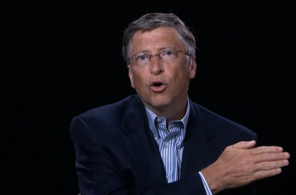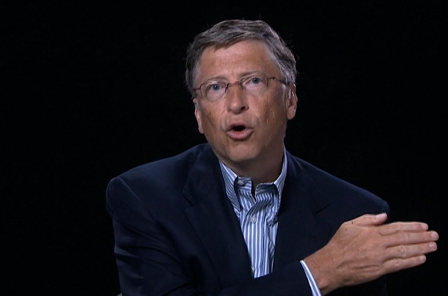
“I’m an optimist,” Bill Gates says, on the subject of nuclear power. “I see materials advances, simulations, better understanding of the scientific phenomena.”
Two things hold up innovation in the nuclear sector: First, the enormous lead-time it takes to research new technology and deploy it. And secondly, a global potpourri of regulations that can constrain innovative technology in favor of tried-and-true reactor design.
U.S. Deputy Secretary Daniel Poneman got Bill Gates on the video-chat line for the International Framework for Nuclear Energy Cooperation meeting in Warsaw, and the resulting interview is now posted on Gates Notes. The theme of the conversation is “Nuclear Energy after Fukushima,” and Gates finds two controversial lessons there.
While acknowledging that the Fukushima reactors’ failure post-earthquake-and-tsunami was a “tragedy,” Gates gingerly characterizes to the overall safety record of Fukushima as being commendable for a plant commissioned in 1971. This leads to his second point: that governmental regulation is biased toward the devil of known reactor design, rather than innovative solutions that take into account advances in software simulation (making it possible to assess virtual performance in a hurricane, earthquake, or tsunami).
“As I look at the energy sector I see that in some ways it’s more complicated than the IT sector where I spent most of my career,” says Gates. He lists the drawbacks of global regulatory complexity, the lead time before return on investment, the necessarily high bar for safety.
Though people may think of the Bill & Melinda Gates Foundation as health-driven, its mission is to improve lives globally through innovation. As he considered the challenges the world’s poor face, says Gates, “I realized the very central role that energy plays in improving their livelihood. We need breakthroughs.”
His advice for governments? You’re under-funding investment in pure energy research by a factor of three or more. This wouldn’t require a gigantic tax on the energy sector, just a few percent, and certainly a lower number than a carbon tax would likely impose. Energy innovation is unlike other areas because of its lengthy time-to-market–if you try to offer incentives on the scale of other industries, you’ll fail.
“We need to have hundreds of companies trying out different things in each sector,” Gates argues, including solar, nuclear, wind, clean coal, and more. Cheap energy that doesn’t carry the greenhouse gas burden of today’s energy sources needs to come pretty quickly.
That preference for implementation seems to have established Gates’ primary bet on nuclear power (he namechecks TerraPower twice). “When you look at the numbers and you say, what could be significantly cheaper than what we have today, and located in every area, nuclear is one of the few that may be able to achieve that.”
He has invested in solar power, but is troubled by its disadvantages as a global solution: The “solar guys” still need to make solar power ten times as cheap, and solve storage and transmission challenges.
In nuclear, “I think you have to go for a big win, because you’re going to have your money tied up for decades.” It will be crucial to harmonize regulations globally, because you need a global market size to justify the size of private investment. Urges Gates: “We’re not gonna have a ton of nuclear start-ups, but we need more.”

While Mr. Gates visionary thinking is useful, I believe one thing that would be of great value in energy discussions is some perspective on how we generate power now – how much, from what sources, and they work. I’ve been in the US nuclear industry over 20 years and it bears little resemblance to what I hear or see in the media – either good or bad.
For information, I can offer my insider’s take on nuclear plants, “Rad Decision”, a novel available online free (no adverts, no sponsors). Just Google the title. It happens to culminate in an event with a strong simularity to Fukushima.
We’ll make better decisions about our energy future if we first understand our energy present.
Bill Gates is the king of software development. He does not have the education and background (except reading books) to discuss energy, not to mention the chemistry of CO2.
Does he also understand that CO2 are being absorbed by the green leaf plants to generate oxygen for us?
How about Nitogen oxides etc.
Bill, leave the energy story to the experts.
JVK
Reference:
http://www.kirschfoundation.org/who/reflection_19.html
Let’s hear what Mr.Kirsch (former founder of Netscape) have to say on nuclear power in 2006, before the disaster at Fugushima. By the way, he is an IT expert, not so in energy.
The entire text:
Reflection #19
“Nuclear Power and its Tremendous Risks”
By Steve Kirsch (4/24/2006)
Most Americans know that burning fossil fuels is the major cause of global warming. The world’s cars, factories, and power plants are injecting carbon dioxide into the atmosphere at a much faster rate than it can be removed by natural biological processes.
America is responsible for a disproportionate portion of this problem. We contribute about one-fourth of all greenhouse gas emissions. In the automobile/truck/SUV segment, we consume 43 percent of the world’s gasoline. So Americans must find alternatives to coal, oil, and natural gas.
Nuclear power seems, at first, to be a very attractive alternative. It appears to be relatively cheap and relatively safe, and it produces no greenhouse gases.
This belief is dead wrong.
In general, the safer a reactor is, the more costly it is to build and operate. American style reactors with redundant safety systems, containment shells, and ever-more-elaborate security provisions are so expensive that no company will build them without subsidies.
Even with safeguards, the insurance industry considers nuclear plants risky. The industry was willing to insure New Orleans against a hurricane, but will not insure a nuclear power plant without a strict, low, absolute limit on liability guaranteed by federal law. If Congress repealed this liability cap, the nuclear industry would cease to exist.
Furthermore, American nuclear plants store their waste on site in above ground casks, vulnerable to terrorist attack. Given the long radioactive life of nuclear material and ongoing terrorist concerns, it is wildly irresponsible to propose a major expansion of nuclear power until we know how to safeguard the waste for thousands of years.
And the claim that nuclear power produces no greenhouse gases does not hold up. Nuclear power plants themselves don’t emit carbon dioxide, but the rest of the fuel cycle depends heavily on fossil fuels. Two of America’s most polluting coal plants, in Ohio and Indiana, mainly supply electricity for the very energy-intensive uranium enrichment process.
Nuclear power plants can also result in major accidents. In addition to plant workers who died immediately after Chernobyl (in what was then the Soviet Union), it is likely that up to 8,000 people will eventually die as a result of what happened. The largest nuclear plant accident in history exposed a thousand plant workers to radiation on the first day, and about 200,000 emergency and recovery operation workers over the 18-month initial clean-up. Even better technology and sophisticated and redoubled safety measures cannot guarantee against such disasters in the future.
But the most powerful argument against nuclear power is that, in this increasingly globalized world, America cannot build its economy around nuclear power that it doesn’t want to share with other countries. Nuclear power and nuclear weapons require the same materials and employ the same technical skills. Nuclear power specialists in India, Pakistan, Israel, North Korea, and Iran proved to be bomb builders as well. If America uses nuclear energy, others will want the same, and that opens the door to nuclear weapons proliferation.
As a father, I want my children to live in a world in which nuclear war and nuclear terrorism are not possible. Horrible as Sept. 11 was, I can’t help but contemplate the far greater carnage had a nuclear device been detonated there instead. That’s why, in my view, nuclear power is not the energy solution to global warming.
April of this year [2006]will mark two anniversaries: Chernobyl’s 20th and Earth Day’s 36th. They come at a time when ignorance about global warming remains. Those who want to sow doubt about it continue a calculated, well-funded misinformation campaign. But it is also a time when the world is alive with ideas for solving climate change.
Those of us in Silicon Valley have a huge concentration of the country’s brainpower and entrepreneurial capital. An ever increasing portion of it should be devoted to finding cost-effective, reliable ways to harness renewable energy sources that produce neither greenhouse gases nor nuclear bomb materials.
—————————
STEVE KIRSCH is CEO of Propel Software, (former founder of Netscape, a search engine). He and his wife started the Steven and Michele Kirsch Foundation, which includes a focus on the threat from nuclear weapons. He wrote this article, which was published as “Despite safeguards, nuclear power carries great risk” in the April 24, 2006 issue of the San Jose Mercury News.
I will mail my comments to Mr. Gates in Seattle.